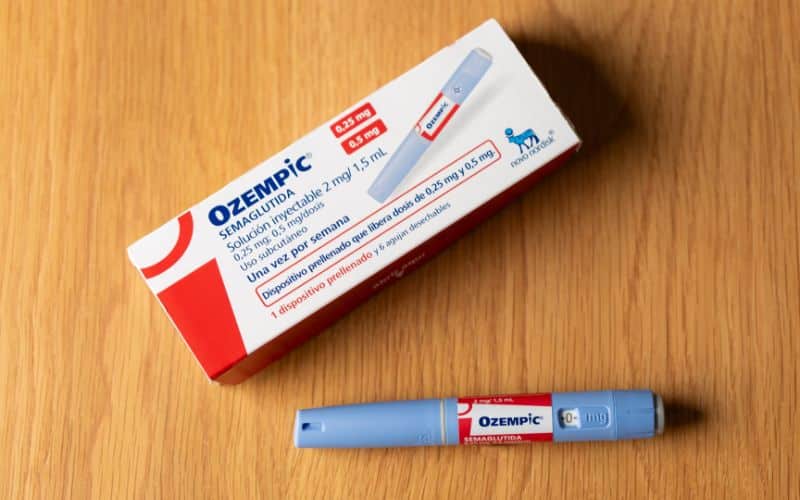Ozempic is a popular medication used to treat type 2 diabetes. However, it has also gained attention for its potential to aid in weight loss. Many people are curious about how long the weight loss effects of Ozempic last and whether they are sustainable in the long term.
Research suggests that Ozempic can lead to modest weight loss in people with type 2 diabetes. According to a study published in the New England Journal of Medicine, participants who took Ozempic lost an average of 13.5 pounds over 52 weeks. However, it's important to note that weight loss results may vary from person to person.
While Ozempic may lead to weight loss, it's important to maintain a healthy diet and exercise regularly to sustain the results. As with any weight loss medication, Ozempic is not a miracle drug and should be used in conjunction with healthy lifestyle habits. In this article, we'll explore the research behind Ozempic and weight loss, as well as provide tips for maintaining weight loss results.
Contents
Understanding Ozempic

Ozempic is a once-weekly injectable medication that has been approved by the FDA for the treatment of type 2 diabetes. It is a glucagon-like peptide-1 (GLP-1) receptor agonist that works by increasing insulin secretion, reducing appetite, and slowing down the emptying of the stomach.
In recent years, Ozempic has gained popularity as a potential weight loss drug. Clinical trials have shown that people who take Ozempic for weight loss can lose a significant amount of weight, with some losing up to 14.9% of their body weight over a period of 68 weeks.
It is important to note, however, that Ozempic is not a miracle weight loss drug. It should only be used under the supervision of a healthcare provider and as part of a comprehensive weight loss plan that includes a healthy diet and regular exercise.
Additionally, the weight loss benefits of Ozempic may not last forever. In a study of people with type 2 diabetes who were taking Ozempic, weight loss was sustained for up to 52 weeks. However, it is not clear how long the weight loss benefits of Ozempic will last for people who are using it solely for weight loss purposes.
It is also important to be aware of the potential side effects of Ozempic, which can include nausea, vomiting, diarrhea, and constipation. In rare cases, it can also lead to pancreatitis, a potentially life-threatening condition. It is important to discuss the potential risks and benefits of Ozempic with a healthcare provider before starting treatment.
Overall, Ozempic can be an effective tool for weight loss when used as part of a comprehensive weight loss plan. However, it is important to use it under the supervision of a healthcare provider and to be aware of the potential risks and limitations of the medication.
The Role of Ozempic in Weight Loss

Ozempic is a medication that has been approved by the FDA for the treatment of type 2 diabetes. However, it has also been found to be effective in promoting weight loss. Ozempic contains semaglutide, which is a glucagon-like peptide-1 (GLP-1) receptor agonist. GLP-1 receptor agonists work by mimicking the effects of a hormone called GLP-1, which is naturally produced by the body and helps to regulate blood sugar levels.
One of the ways that Ozempic promotes weight loss is by reducing appetite. GLP-1 receptor agonists like Ozempic have been shown to decrease hunger and increase feelings of fullness, which can lead to a reduction in calorie intake. Ozempic has also been found to slow down the emptying of the stomach, which can further help to reduce appetite and promote weight loss.
In addition to reducing appetite, Ozempic has also been found to increase the body's sensitivity to insulin. This means that the body is better able to use insulin to regulate blood sugar levels, which can help to prevent the accumulation of fat in the body. By improving insulin sensitivity, Ozempic can also help to reduce the risk of developing type 2 diabetes.
It is important to note that the weight loss effects of Ozempic are not permanent. Studies have shown that weight loss with Ozempic is most significant during the first six months of treatment, with weight loss tapering off after that. However, even after weight loss slows down, Ozempic can still be effective in helping to maintain weight loss and preventing weight gain.
Overall, Ozempic can be an effective tool for promoting weight loss in individuals who are struggling with obesity or who have type 2 diabetes. However, it is important to use Ozempic as part of a comprehensive weight loss plan that includes a healthy diet and regular exercise.
Duration of Weight Loss with Ozempic

Ozempic is a medication that has been approved by the FDA for the treatment of type 2 diabetes and obesity. It is a once-weekly injectable medication that has been shown to be effective in helping people lose weight.
According to a study published in theNew England Journal of Medicine, people who took Ozempic lost an average of 15% of their body weight over a period of 68 weeks. However, it is important to note that weight loss results may vary from person to person.
The duration of weight loss with Ozempic will depend on a variety of factors, including the individual's starting weight, diet, exercise habits, and overall health. It is important to continue taking Ozempic as prescribed by a healthcare provider to maintain weight loss results.
It is also important to note that weight loss with Ozempic may not be permanent. In a study published in the Lancet, people who stopped taking Ozempic after achieving weight loss regained an average of 6.4% of their body weight within 28 weeks.
In summary, the duration of weight loss with Ozempic will vary from person to person and may not be permanent. It is important to continue taking Ozempic as prescribed and to maintain healthy lifestyle habits to achieve long-term weight loss success.
Factors Influencing Weight Loss Duration
The duration of weight loss with Ozempic can vary depending on various factors. Here are some of the factors that can influence the duration of weight loss:
Starting weight
The starting weight of an individual can play a significant role in determining the duration of weight loss with Ozempic. According to Dr. Andres Acosta, an assistant professor of medicine, a consultant in gastroenterology, and an expert in obesity medicine, people who start at a higher weight may experience more rapid weight loss initially, but weight loss may slow down over time.
Dosage
The dosage of Ozempic can also impact the duration of weight loss. The higher the dosage, the more weight loss an individual may experience. However, it is important to note that increasing the dosage may also increase the risk of side effects.
Diet and exercise
Diet and exercise can also affect the duration of weight loss with Ozempic. People who follow a healthy diet and exercise regularly may experience more significant weight loss and maintain it for a longer time.
Adherence to treatment
Adherence to treatment is crucial for achieving and maintaining weight loss with Ozempic. People who adhere to the treatment regimen and take Ozempic as prescribed are more likely to experience long-term weight loss.
Metabolism
Metabolism can also play a role in the duration of weight loss with Ozempic. People with a slower metabolism may experience slower weight loss, while those with a faster metabolism may experience more rapid weight loss.
Other health conditions
Other health conditions, such as thyroid disorders or hormonal imbalances, can also impact the duration of weight loss with Ozempic. It is important to discuss any underlying health conditions with a healthcare provider to determine the best course of treatment.
In conclusion, the duration of weight loss with Ozempic can vary depending on several factors. People who start at a higher weight, follow a healthy diet and exercise regimen, adhere to treatment, and have a faster metabolism may experience more significant weight loss and maintain it for a longer time. However, it is important to discuss any underlying health conditions and medication dosages with a healthcare provider to determine the best course of treatment.
Comparative Analysis: Ozempic Vs Other Weight Loss Methods

When it comes to weight loss, there are a variety of methods available, each with its own pros and cons. Here, we will compare Ozempic with some of the other common weight loss methods.
Ozempic Vs Diet and Exercise
Diet and exercise are the most commonly recommended weight loss methods. They are safe, effective, and can be maintained long-term. However, they require significant lifestyle changes and may not be suitable for everyone.
Compared to diet and exercise, Ozempic can provide faster weight loss results. In clinical trials, patients taking Ozempic lost an average of 12-14% of their body weight in 6 months. However, it is important to note that Ozempic is not a substitute for a healthy diet and exercise routine.
Ozempic Vs Other Weight Loss Medications
There are several other weight loss medications available, such as phentermine and liraglutide. Like Ozempic, these medications work by suppressing appetite and increasing feelings of fullness. However, Ozempic has been shown to be more effective than these medications in terms of weight loss and blood sugar control.
Ozempic Vs Bariatric Surgery
Bariatric surgery is a more invasive weight loss method that involves altering the digestive system to limit food intake. It is generally reserved for patients with a BMI over 40 or those with a BMI over 35 and a weight-related health condition.
Compared to bariatric surgery, Ozempic is less invasive and has fewer risks. However, bariatric surgery has been shown to provide more significant and long-lasting weight loss results.
In conclusion, Ozempic is a safe and effective weight loss method that can provide faster results than diet and exercise alone. While it may not be suitable for everyone, it is a viable option for those struggling with obesity.
Potential Side Effects of Ozempic

When taking any medication, it is important to be aware of the potential side effects. Ozempic is no exception. While many people tolerate the drug well, some may experience side effects. In this section, we will discuss the common and severe side effects of Ozempic.
Common Side Effects
According to Medical News Today, some of the common side effects of Ozempic include:
- Gas and burping
- Dizziness
- Nausea
- Vomiting
- Diarrhea
- Abdominal pain
- Constipation
- Fatigue
- Changes in your sense of taste
These side effects are usually mild and go away on their own. However, if you experience severe or persistent side effects, you should contact your healthcare provider.
Severe Side Effects
While rare, Ozempic can cause severe side effects. According to Forbes, some of the severe side effects of Ozempic include:
- Pancreatitis
- Kidney problems
- Thyroid cancer
- Hypoglycemia (low blood sugar)
- Allergic reactions
If you experience any of these severe side effects, you should seek immediate medical attention.
It is important to note that this is not a complete list of side effects. If you have any concerns about the side effects of Ozempic, you should speak with your healthcare provider. They can provide you with more information and help you determine if Ozempic is right for you.
Maintaining Weight Loss After Ozempic

While Ozempic has been shown to be effective in promoting weight loss, it is important to note that the medication is not a magic solution for maintaining weight loss. To maintain weight loss after Ozempic, it is crucial to adopt and maintain a healthy lifestyle.
One of the key factors in maintaining weight loss after Ozempic is to continue with a healthy diet. This includes consuming a balanced diet that is rich in fruits, vegetables, lean protein, and whole grains. It is also important to limit the intake of processed foods, sugary drinks, and high-fat foods.
Another important factor in maintaining weight loss after Ozempic is to engage in regular physical activity. This can include a combination of cardiovascular exercise, strength training, and flexibility exercises. Aim for at least 150 minutes of moderate-intensity exercise per week.
In addition to diet and exercise, it is important to monitor your weight regularly. This can help you catch any weight gain early on and make necessary adjustments to your lifestyle. Consider weighing yourself on a weekly basis and keeping track of your progress in a journal or tracking app.
Finally, it is important to continue to work with your healthcare provider to monitor your health and weight loss progress. They can provide guidance and support in maintaining a healthy lifestyle and adjusting your medication as needed.
Overall, maintaining weight loss after Ozempic requires a commitment to a healthy lifestyle that includes a balanced diet, regular physical activity, and ongoing monitoring of weight and health. By making these lifestyle changes, you can improve your overall health and maintain the weight loss achieved with Ozempic.
Conclusion
In conclusion, Ozempic has been shown to be an effective weight loss treatment for individuals with obesity. According to a study published in the New England Journal of Medicine, patients taking Ozempic lost an average of 15% of their body weight over a 68-week period. However, it is important to note that weight loss results may vary depending on the individual's lifestyle, diet, and exercise habits.
While Ozempic has been shown to be effective in promoting weight loss, it is not a miracle drug. It should be used in conjunction with a healthy lifestyle that includes regular exercise and a balanced diet. It is also important to note that Ozempic is a prescription medication and should only be taken under the guidance of a healthcare provider.
Furthermore, it is important to note that the long-term effects of Ozempic on weight loss are still being studied. While the medication has been shown to be effective in the short term, more research is needed to determine its long-term effects on weight loss and overall health.
Overall, Ozempic can be an effective tool for individuals struggling with obesity and seeking to lose weight. However, it should be used in conjunction with a healthy lifestyle and under the guidance of a healthcare provider.






